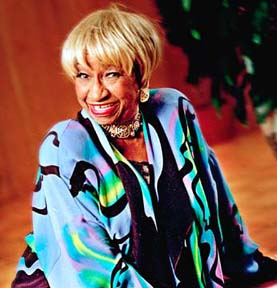
CELIA CRUZ / 'QUEEN OF SALSA'
ASSOCIATED PRESS / 2002
Latin singer Celia Cruz performs during a rehearsal for the Latin Grammys in Los Angeles. Cruz died yesterday in her Fort Lee, N.J., house. She performed in Hawaii last July.
Afro-Cuban music
icon dazzled with
her personality
NEW YORK >> Celia Cruz, who went from singing in Havana nightclubs to become the "Queen of Salsa," died yesterday, her publicist said.
Cruz, who was 77, died of a brain tumor. She had surgery for the ailment in December, but her health faltered. She died at her home in Fort Lee, N.J., according to her publicist, Blanca Lasalle.
Her husband, trumpeter Pedro Knight, was at her side; the pair had celebrated their 41st wedding anniversary on Monday, Lasalle said.
Ruben Blades, a frequent collaborator and friend, called Cruz a classy icon whose dynamic performances became her trademark.
"Celia Cruz could take any song and make it unforgettable. She transcended the material," Blades said last night. "With Celia, even the most simple of songs became injected with her personality and her vigor."
"I don't think you could hear anything she ever did and be indifferent," he said.
Cruz studied to be a teacher in her native Havana but was lured into show business when a relative entered her in a radio talent contest, which she won. She later studied music at the Havana Conservatory and performed at the world-famous Tropicana nightclub.
In the 1950s, Cruz became famous with the legendary Afro-Cuban group La Sonora Matancera. She left Cuba after its 1959 revolution for the United States in 1960, and never returned.
Cruz was branded persona non grata by Fidel Castro's government in Cuba for leaving the country in 1960. She was refused entry when her mother was sick and father died. Asked if she would ever return to Cuba, Cruz said last July in an interview with the Star-Bulletin to promote her Hawaii concerts, "I hope so, but I will never go there until the present political regime is out of there."
With her powerful voice and flamboyant stage shows, Cruz helped bring salsa music to a broad audience. Celia Cruz made her one and only visit to the islands in late July 2002, where she did two well-received shows on Oahu and Maui.
"She became a symbol of quality and strength, and she became a symbol of Afro-Cuban music," Blades said. "You couldn't be a fan of Celia and not be a fan of Afro-Cuban music, because she was Afro-Cuban music."
Cruz dazzled not only with her voice, but also her personality. Always flashing a wide smile, the entertainer gave a highly energetic stage show, punctuated often by her trademark shout, "Azucar!" in the middle of a song. The word, which means "sugar" in Spanish, became her catch phrase after a waiter apparently asked her, to her surprise, if she wanted sugar in her coffee.
Her alliance with fellow salsa star and "Mambo King" Tito Puente resulted in some of the biggest successes in her career. The two recorded albums and regularly performed together, and they were considered legends of the genre.
She was also a member of the Fania All-Stars, the Afro-Cuban music collective that recorded for the Fania record label in the 1970s, along with Blades and Willie Colon. She dazzled listeners with fiery songs such as "Quimbara."
Blades noted that although she was typically the only woman excelling in the salsa field, she was never intimidated.
"She was a proud woman in a male-dominated business where she excelled because she had class herself," he said.
She recorded more than 70 albums and had more than a dozen Grammy nominations. She won best salsa album for "La Negra Tiene Tumbao" at last year's Latin Grammy Awards, and won the same award at this year's Grammy Awards. The life and persona of Cruz can be found on the biographical track from her last studio album, the Grammy-winning "La Negra Tiene Tumbao." There's a lyric on "Corazon de Rumba" that translates to "My flag is happiness, and my purpose is to sing." Among her other best-known recordings are "Yerberito Moderno" and "Que le Den Candela."
Called the "Queen of Salsa" and the "diva of Latin song," Cruz remained energetic late into her career, popular with young audiences as well as old. At last year's Latin Grammys, she showed up wearing a frothy blue-and-white headpiece and a tight red dress and gave a hip-shaking performance.
In 1987 she was honored with a star on Hollywood's Walk of Fame, and several years later the city of Miami gave Calle Ocho, the main street of its Cuban community, the honorary name of Celia Cruz Way.
Cruz also received a Lifetime Achievement Award from the Smithsonian Institution, and in 1994, President Clinton honored her with an award from the National Endowment for the Arts.
The Recording Academy and Latin Recording Academy issued a statement yesterday that read in part: "One of Latin music's most respected and most revered vocalists, Celia Cruz was an icon of salsa, tropical and Latin jazz music. ... Thank you, Celia, for teaching all of us that life should be lived with much 'Azucar!'"
Pop and salsa singer Marc Anthony, a friend who recently paid tribute to Cruz at a gala concert, said in a statement: "We are witnessing the end of an era. She is simply irreplaceable, and it's just an honor to know that she was a part of my life."
Blades said Cruz's music and the legacy she left behind would live on.
"The real death begins when you forget," he said. "No one is going to forget Celia."
Star-Bulletin staff and Associated Press writer Nekesa Mumbi Moody contributed to this article.
